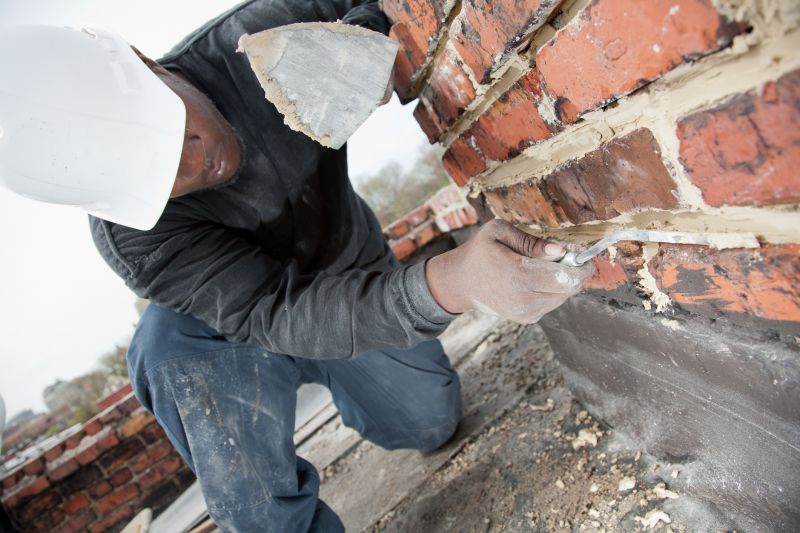Expert Picks For Tuckpointing Repair Supplies To Fix Cracks and Gaps
Find high-quality tools and materials selected by professionals to simplify your tuckpointing projects and achieve seamless finishes.
 Tuckpointing repairs are essential for maintaining the structural integrity and aesthetic appeal of brickwork and masonry surfaces. Over time, mortar joints can deteriorate due to weather exposure, settling, or age, leading to cracks, gaps, and potential water infiltration. Selecting the right products for tuckpointing repairs ensures that repairs are durable, effective, and visually consistent with existing masonry. From specialized mortars to precise tools, a wide array of products are available to assist both professionals and DIY enthusiasts in restoring brickwork efficiently.
Tuckpointing repairs are essential for maintaining the structural integrity and aesthetic appeal of brickwork and masonry surfaces. Over time, mortar joints can deteriorate due to weather exposure, settling, or age, leading to cracks, gaps, and potential water infiltration. Selecting the right products for tuckpointing repairs ensures that repairs are durable, effective, and visually consistent with existing masonry. From specialized mortars to precise tools, a wide array of products are available to assist both professionals and DIY enthusiasts in restoring brickwork efficiently.
Top Overall Option
High-Performance Masonry Mortar Mix
A versatile and durable mortar mix designed specifically for tuckpointing applications. It offers excellent adhesion, workability, and color-matching capabilities, making it suitable for a variety of masonry repairs. This product is formulated to withstand weathering and aging, helping to maintain the integrity and appearance of brickwork over time.
Types of Products For Tuckpointing Repairs
Pre-mixed Masonry Mortar
Ready-to-use mortar that simplifies application for small to medium repairs, offering convenience and consistency.
Hydraulic Lime Mortar
Traditional mortar suitable for historic restorations, providing flexibility and breathability.
Polymer-Modified Mortar
Enhanced mortar with added polymers for improved adhesion and flexibility, ideal for areas prone to movement.
Color-Matched Mortar
Mortar formulations designed to blend seamlessly with existing brickwork for aesthetic consistency.
Joint Rakers
Tools used to remove old mortar from joints, preparing surfaces for new mortar application.
Pointing Trowels
Specialized trowels for applying and shaping mortar within joints for a neat finish.
Mortar Color Stains
Products used to tint mortar for matching or accentuating existing masonry colors.
Sealants for Masonry
Flexible sealants that fill small cracks and prevent water infiltration, prolonging repair longevity.
Masonry Brushes
Tools for cleaning joints and surfaces before and after mortar application.
Mortar Repair Patches
Pre-formed patches for quick repair of larger damaged areas.
Waterproofing Masonry Sealers
Products designed to protect repaired joints from moisture penetration.
Flexible Repair Caulks
Elastic caulks for sealing and filling small joints or cracks in masonry surfaces.
Joint Spatulas
Tools for smoothing and shaping mortar within joints for a finished appearance.
Grout Removal Tools
Specialized tools for efficiently removing old or damaged mortar from joints.
Mortar Color Pigments
Powder or liquid pigments used to customize mortar color for matching existing mortar.
Repointing Saws
Tools for cutting clean, precise joint edges before mortar application.
Masonry Sponges
Absorbent sponges used to clean excess mortar and achieve a smooth finish.
Popular Choices
Widely used for various tuckpointing projects, appreciated for its versatility and ease of use.
Popular for sealing small cracks and joints, providing flexibility and water resistance.
Frequently selected for aesthetic blending with existing brickwork.
Commonly used for removing old mortar, facilitating clean repairs.
Preferred for precise application and shaping of mortar joints.
Chosen for projects requiring traditional materials and compatibility with older masonry.
Popular for customizing and matching mortar colors during repairs.
Commonly used to protect repaired joints from moisture damage.
Convenient for quick repairs, especially for small-scale projects.
Valued for filling small cracks with elasticity and ease of application.
Favored for creating clean, precise joint cuts before applying new mortar.
Popular for smoothing and cleaning mortar surfaces during repairs.
Used frequently to achieve specific color matches or accents.
Tools that assist in precise application of sealants and caulks.
Tools designed to shape and smooth mortar joints for a professional look.
Convenient options for patching larger damaged areas quickly.
Proper tuckpointing involves carefully removing damaged mortar, cleaning the joints, and applying new mortar with precision. The choice of materials—such as mortar types, pointing trowels, and joint rakers—can significantly influence the quality of the repair. It is important to consider factors like compatibility with existing mortar, ease of application, and long-term performance when selecting products. Using high-quality, appropriate materials can help prevent future issues and extend the lifespan of the masonry.
In addition to traditional mortar and tools, there are specialized repair products designed to match various brick and mortar styles, including color-matched mortars and flexible sealants. These products provide options for addressing different types of damage, whether minor cracks or extensive joint replacements. Proper preparation, combined with the right selection of products, can improve the overall outcome of tuckpointing projects, whether for restoration, maintenance, or new construction. Investing in the right products can make the process smoother and provide more reliable results over time.
Key Buying Considerations
- Compatibility with existing mortar and brick materials to ensure seamless repairs.
- Type of mortar suitable for your specific project, such as traditional lime or modern cement-based mixes.
- Ease of application and workability, especially if performing DIY repairs.
- Color-matching capabilities for aesthetic consistency with surrounding masonry.
- Durability and weather resistance to withstand environmental conditions.
- Flexibility of the mortar or sealant to accommodate slight movement or settling.
- Curing time and working time to fit your project schedule.
- Compatibility with tools you plan to use, such as trowels, spatulas, or rakes.
- Waterproofing and sealing features to prevent future water infiltration.
- Cost and availability of the products for your project scope.
- Environmental considerations, if any, related to product formulation.
- Brand reputation and reviews to gauge product performance.
- Application temperature ranges to ensure proper curing conditions.
- Long-term maintenance requirements for the repair materials.
- Flexibility of repair products for areas prone to movement or vibration.
